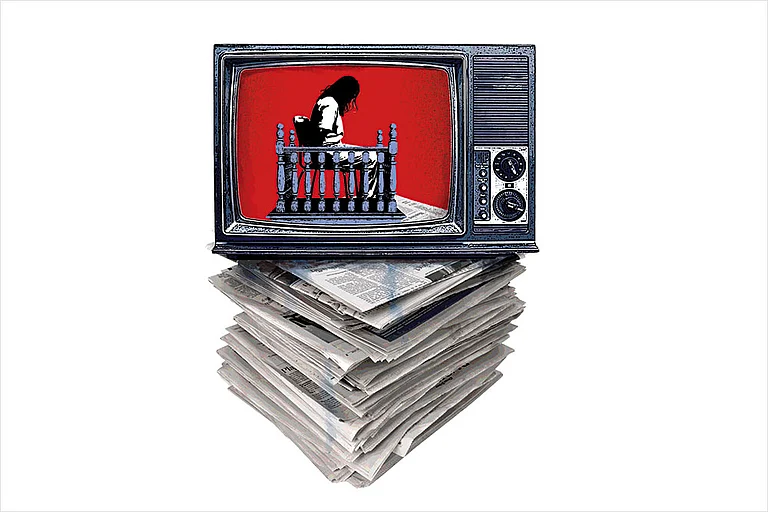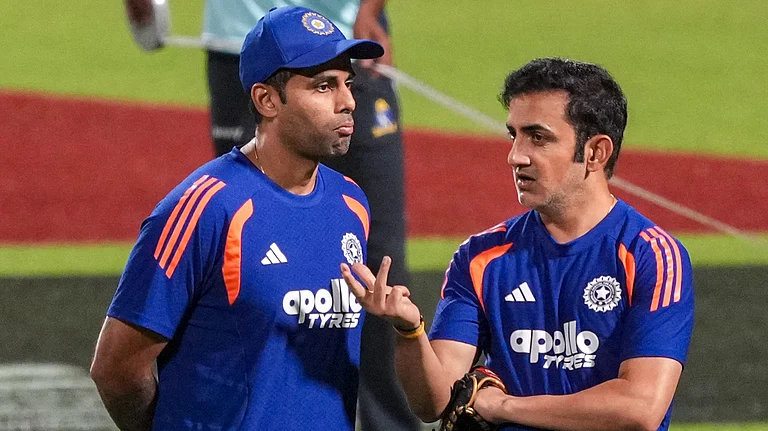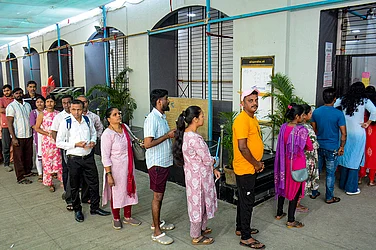Aftab–Shraddha case has been largely constructed and viewed as yet another crime of passion. Aftab is being diagnosed as a psychopath, an individual who displays an abnormal degree of impulsive behaviour, has aggressive tendencies and shows little consideration for societal norms. One can delve into his childhood, relationship with parents, family history and memories of trauma to understand the pathology.
But should the episode be located within a single individual or be used as a case study to illustrate the obvious and subtle ways in which our discourse on love is becoming increasingly consumption focussed and self-centred? A discourse that does not try to examine the psychological aspects of violent love and ignores the thin line between obsessive and committed love.
The philosopher Alain De Botton writes that the most dangerous presumption of love is that the ‘other’ is both the centre of one’s emotional existence and responsible for nearly everything that happens to us. This can lead to ‘romantic terrorism’, violence a person inflicts on their loved one for not loving them the way they want. It is a brutality inflicted for not loving enough and might have little connection with the actual behaviour that evoked the felt insult. Aftab’s actions are also said to be inspired by the TV series Dexter. It is presented as an ultimate act of avenging oneself, which might have brought him a perceived equilibrium, a highly disturbing state for us but an act that somehow settled his rage temporarily.
Where are the seeds of such behaviour? Many of us in the subcontinent learn the etiquette of romance from films. Several blockbusters are often critiqued for their misogynist depiction of romance and courtship and blamed for corrupting the experience of love. In 2016, a Snapdeal employee, inspired by the movie Darr, abducted his love interest. Similar incidents were claimed to be inspired from films like Kabir Singh and Tere Naam, where the protagonist took the role of an obsessive lover in unrequited or lost love. Besides, there is another category of films in which aggression and violence are perceived as desirable by the protagonists. Both kinds of movies receive immense viewership and shape the discourse around the expression of desire.

Cinema in many cultures often tends to blur the fine line between passion and invasion and romance and violence. While such cinema points to a pivotal human experience of loss of self, critical to such a state of love, it also legitimises brutalities on the pretext of romance. In a culture like ours, where films sculpt our gendered mannerisms and affective expressions, the hero and the anti-hero are permanently situated in us.
In the Aftab case, investigations have revealed the occurrence of violence in the relationship, but she continued to stay in, thus compromising her safety. What accounts for the elusive desire that enables such self-destructive behaviour? This semi-conscious pull towards another is often not based on rational assessments but needs an instinct that evokes a false sense of completeness through the other. For instance, one might perceive the other’s aggressive tendencies as strength and markers of masculinity. The feeling of being with someone with superior qualities also bestows on us a certain specialness which life otherwise fails to provide. The damsel in distress and hero archetypes in love exemplifies such behaviour well.
The joy of being in love stands in contrast to findings from neurophysiology that underline an altered brain activity in frustrated or failed romantic relationships. In a 2005 research, anthropologist Helen Fisher, social psychologist Arthur Aron and neurologists Dr Lucy Brown found the brain activity of college students in romantic love to be closer to that in hunger and drug craving in comparison to the state of excitement and affection. Brain imaging detected neural activity in the caudate nucleus and right ventral tegmental area. These parts of brain are dense in cells that secrete dopamine, a neurotransmitter linked to feelings of gratification and motivation.
Significantly, dopamine is also associated with the symptoms of schizophrenia, a mental state that disrupts the reality orientation of an individual. Hence, the infatuated lover is an irrational being who, in early stages of romance, is not quite capable of making and sustaining long-term realistic decisions.
The issue gets aggravated in a society like ours where we rarely discuss romance ethics and the focus remains on curbing sexuality. The language of both requited and rejected love further complicates the issue. The ease with which many can say “I love you” and the hardened difficulty with saying “I felt let down by you and the hurt fills me with rage” points to inadequacies of the language.
Besides, the symbology of love has come to rest on assertions and declarations, with little space for nuances and complexities. There often exists a wide gap between the imagined realities and the lived reality of a couple. They cloak their insecurities through certain displayers like gifts, hashtags and profile pictures, only to find the crisis aggravated. Worse, in contemporary discourse, commitment is largely defined through fidelity, mainly sexual fidelity. But commitment would also mean to stay, settle, pause and be open to change for the other. Our Zomatized world rarely permits such states, as persistence seems like a herculean task. We are becoming habituated to this flux, a constant unease, a never ending haste that affects love as well. Insanity always seems like a step away. Hence, the profound grief of unrequited love that evokes beautiful and poignant poetry can also be a trigger for gruesome violence.
It is time to critique the pedestal on which we have placed romantic love. Experience of romantic love is believed to be a requirement in life, which pushes one to a constant and tormenting search for a partner. The idea of love today is increasingly being used as a tranquilizer for festering wounds and an escape from one’s loneliness. Love is rarely defined as a path of self evolution, which requires constant negotiations and endurance.
In its absence, one leads to people like Aftab. He is an accused and a convict, if the offence is proved. But is he a clinical case of a psychopath? Or is he a jilted lover who has lost his orientation to reality? Or a person persuaded by the society and the prevailing media to take the extreme path? One may not find any easy answer, but the exploration of these questions should lead to some clues that could help us demystify this dangerous side of love.
(This appeared in the print edition as "Demystifying a ‘Psychopath’")
(Views expressed are personal)
Annie Baxi teaches psychology at Delhi University





















